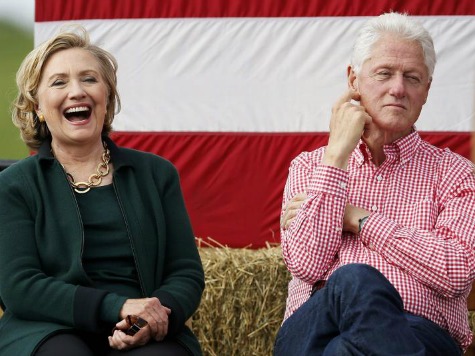
Two weeks ago, President Obama attended a rally for Maryland Governor candidate Anthony Brown. His appearance in Maryland, a state he won by 25 points in 2012, was his first campaign rally of the 2014 election. At the time, Brown was leading his Republican opponent by around 10 points. Since then, however, the polls have tightened. On Friday, Cook Political Report changed its rating of the race to “toss up.” Such is the “Obama Challenge” this year for Democrats.
With just 2 days until the election, Bill and Hillary Clinton are criss-crossing the country, attending final campaign rallies for a host of Democrat Senate candidates in tight elections. Hillary has spoken at events in Louisiana, Kentucky and New Hampshire. Bill stumped in North Carolina and his home state of Arkansas.
The late events cap several weeks of campaigning by Bill and Hillary, seeking to stem expected Democrat losses in the Senate. The tight, and bitter, fight for control of Congress’ upper chamber is the prize fight of the 2014 midterms. President Obama, however, has limited his campaign appearances to Democrats running for Governor. His schedule has been further limited by restricting his campaigning to the deepest-blue areas in blue states where his personal appeal still has some currency.
The contrast in schedules between Obama and the Clintons is the result of a political coup in everything but name. In campaigns for federal office, Democrat candidates are eager to associate themselves with the Clintons and hope that voters forget their ties to Obama. Some candidates will still campaign for Obama, but only for offices that were far removed from the decisions and policies promoted by his White House.
Democrat candidates flocking to the Clintons are eager to show voters their political convictions lay beyond Obama. Their Democrat party label is not tied to Obama, but to a tradition and beliefs that predate and will survive him. Alaska Sen. Mark Begich remarkably even sought to reassure voters that Obama will only be in office for two more years, but, if reelected, he would serve for four years beyond the President.
“I did (vote for him), but that’s irrelevant,” he told the Washington Examiner. “The president’s not relevant. He’s gone in two years.” Georgia Senate candidate Michelle Nunn said something similar, while Kentucky Senate candidate Alison Lundergan Grimes went further and dodged questions about whether she actually voted for Obama.
Second-term Presidents often begin to lose influence on their party as their term nears its end, as activists and politicians begin jockeying for position with possible successors. This phenomenon usually happens after the second-term midterm, however. This party coup has happened while voters still have an opportunity to render political judgment on the current incumbent.
The Clinton campaigning is not likely to avert disaster for Senate Democrats. Their presence on the trail is more about the post-election calculus than staving off the inevitable defeat of many Democrat incumbents and candidates. They are both reclaiming their position as heads of the party and reminding voters that there is a political vehicle for their beliefs after Obama. The “Obama Era” of the Democrat party is over.

COMMENTS
Please let us know if you're having issues with commenting.